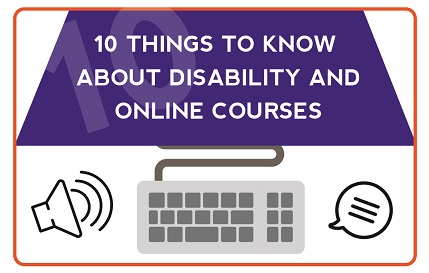
Are you an online student with a disability? If not, then perhaps you know an online student with a disability or have interacted with that student in an online class? Or maybe you have simply wondered as an online student if adjustments to your online course could help you better access and engage with your course material and online peers. Here are a few tips to help improve your overall online learning experience.
- Don’t assume that because your course is online it will be accessible. According to Ann Fredricksen, Disability Specialist at the University of Illinois, “if you are unable to access your course materials (for example, you have a hearing impairment and the lecture videos don’t have captions) immediately report any problems to your professor or IT support so that problems can be dealt with swiftly."
- Instructors cannot provide individual student accommodations unless they have received an accommodation letter from the disability services office at the university. By law, students have the right to choose to self-disclose their accommodation to an instructor teaching a course they are taking. It is always helpful, however, if students can share their accommodation letter with their instructor earlier, rather than later. It may take considerable time to handle accommodations like printed text conversion for blind users, and accommodation for needs like extended testing time cannot be provided retroactively after the student has already taken a quiz or exam.
- If you are a student who thinks you may have an accommodation need, contact your disability resources office. Many forms of cognitive disability may go undetected through primary school and even into college, while other accommodation needs may emerge or develop from a variety of conditions or life circumstances. Your disability resources office can arrange for specific testing to determine whether you have an accommodation need. It may be as simple as a distraction-free environment when taking tests, or the need for additional testing time on exams.
- Don’t assume that accommodations give students an unfair advantage. Reasonable accommodations do not guarantee success, nor do they give students an unfair advantage. Accommodations help level the playing field in providing access to classes, resources, and instruction.
- If you are participating in a live online session or web conference phone call, identify yourself. According to Jon Gunderson, Coordinator for the IT Accessible Information Technology Group at the University of Illinois, “80% of the disabilities served are invisible.” This is especially true in an online setting where you may not be able to see your peers.
- If you are a student with a disability, test the course early with any assistive device you might be using. Check that chats, homework upload, and exam locations are accessible and meet your accommodation need. Make sure that external links work, that any video and audio players work and that you can navigate through the layout of your course site (sidebars and tabs). Check to see if you can change the font or background of your course website for contrast.
- Videos that are shown should have captioning, not just for the hearing impaired, but for everyone. According to Angella Anderson, Disability Specialist at the University of Illinois, “captioning in classes has been shown to increase comprehension for everyone in the course, not just for those with hearing impairments but also for students with learning disabilities, and for students where English is a Second Language.
- Not all captioning is created equal. Most vendors claim their captions are 95-99% accurate (not necessarily containing ah’s, um’s and stutters) and people generally talk about 150 wpm (words per minute). If you are 99% accurate, then every 2 minutes there are 3 words that are wrong. A good number of online videos are around 10 minutes long, so that is 15 incorrect words every video. Ask yourself: were those words important to your education?
- Just because a book is electronic, doesn’t necessarily mean it is accessible. Many electronic texts are unfortunately not keyboard friendly or accessible and may be in a proprietary format that cannot be accessed by blind students or students with specific types of motor impairment.
- The American Disability Act (ADA) technically ends at the US border. It is not clear how the Internet and the border interact—although if an institution creates an online course and they get money from their state or the federal government, then they are usually required to make certain their course is fully accessible.
See the Strategies compiled by the University of Illinois' Disability Resources and Education Services for a variety of resources that may be helpful to you in your academic endeavors.